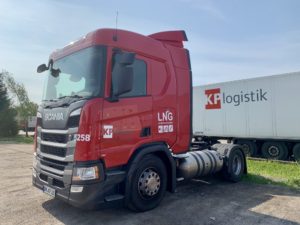 KP Logistik had ordered 100 LNG Scania from Scania Germany last March. 40 of them are already in use. "The fuel consumption meets our expectations and the vehicles are very popular with our drivers due to the reduced driving noise," reports Managing Director David Brokholm. The remaining LNG semitrailer tractors will be delivered to KP Logistik in the next few weeks. The company already operates the largest LNG fleet in Germany.
KP Logistik had ordered 100 LNG Scania from Scania Germany last March. 40 of them are already in use. "The fuel consumption meets our expectations and the vehicles are very popular with our drivers due to the reduced driving noise," reports Managing Director David Brokholm. The remaining LNG semitrailer tractors will be delivered to KP Logistik in the next few weeks. The company already operates the largest LNG fleet in Germany.
Trucks with a methane engine are a sensible alternative with a future character. They protect the environment and pay off economically. Whether compressed or liquefied gas does not matter. The CNG and LNG trucks emit up to 20 percent less CO 2 than fossil natural gas compared with comparable diesel trucks . With biomethane, the value can climb up to 90 percent. That makes itself good in the climate balance of the forwarding agencies.
Gas trucks reduce operating costs. There are less fuel costs because natural gas is cheaper than diesel and consumption is lower. And when it comes to purchasing, the federal government is currently helping a lot with funding. In addition, gas trucks in Germany have been exempt from tolls for at least two years since 2019. It is also important that they do not have to fear any driving bans in inner cities and metropolitan areas. For this, customers have to dig deeper into their pockets when purchasing natural gas trucks. That's true. Depending on the variant - ie CNG or LNG - the vehicles are between 20 and 35 percent more expensive. However, the investments have already paid off after 24 to 42 months, depending on the annual mileage and the use of the subsidy programs.
